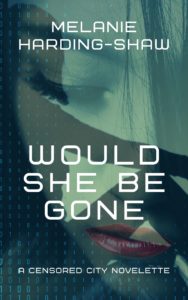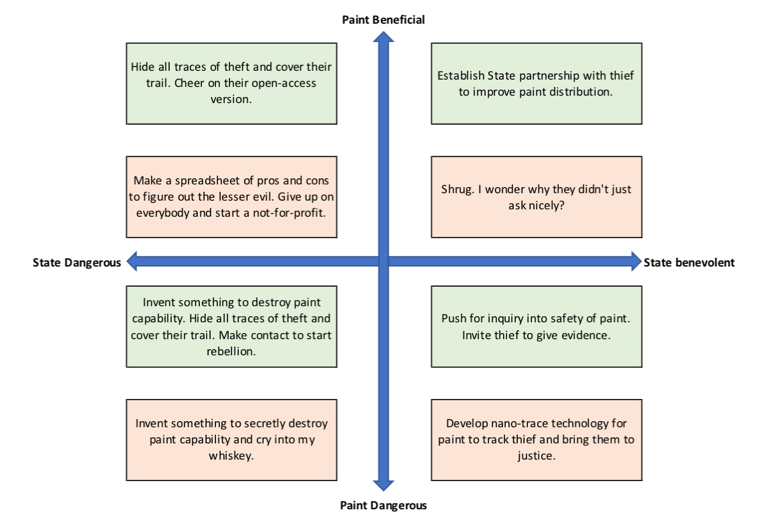 Melanie Harding-Shaw is a speculative fiction writer, policy geek, and mother-of-three from Wellington, New Zealand. Her short fiction has been published all over the place, including at Daily Science Fiction, The Arcanist, and newsroom. Her slightly longer fiction is available as a series of novelettes on Amazon and Book Depository.
Melanie Harding-Shaw is a speculative fiction writer, policy geek, and mother-of-three from Wellington, New Zealand. Her short fiction has been published all over the place, including at Daily Science Fiction, The Arcanist, and newsroom. Her slightly longer fiction is available as a series of novelettes on Amazon and Book Depository.
[ Would She Be Gone | Web | Twitter | FB ]
Q: You’re a living, breathing Worldcon bible at the moment. You’ve managed to wrangle an exceptional scholarship programme. How’d you manage this? How can people get involved and/or apply?
A: Lol. I’m not religious, but I love the idea of being a living, breathing book! The great thing about Worldcon is you don’t have to take my proselytising on faith. It’s the 78th time the convention has been held and you can already see a bunch of exciting confirmed speakers on the website including you, Richard!
I’ve been working as the convention’s NZ Writer Liaison for around six months, encouraging writers to attend and helping them navigate opportunities to participate. Part of the reason I wanted to take on that role is because I had noticed that there were some conspicuous absences from the Sir Julius Vogel Awards finalists last year. People like Steph Matuku and Whiti Hereaka, who were all over New Zealand’s Children and Young Adult Book Awards for their speculative fiction but weren’t getting the recognition they deserved in the local convention scene. I really wanted to hear from them, and the full range of speculative fiction creators in Aotearoa, at Worldcon (Steph is on the confirmed participants list already. Yay!).
Sometimes all that’s needed is to make someone feel welcome and sometimes there are other barriers keeping people from attending. That’s what the scholarship is about. Helping everyone benefit from the opportunity this kind of international convention presents, and helping the rest of us benefit from having a broader range of perspectives at the table. I definitely couldn’t have set up on my own. The wonderful Cassie Hart has been working away with me on the proposal, and in an organisation the size of CoNZealand there are many volunteers and divisions that have to work together to make something like this happen. And for the next stage we have Wellington writer Toni Wi lined up to help manage the applications for us as well.
How can people get involved? Throw cash at us if you have some spare! Please! Every bit makes a difference. And if you don’t have cash, then just share the call around to everyone you know. We’re prioritising scholarships for New Zealanders from marginalised communities, including Māori, Pasifika, People of Colour, LGBTQIA+, disabled and socio-economically disadvantaged. If this scholarship would make the difference to being able to attend, please apply by the end of March! Don’t self-reject and don’t think someone else is more worthy.
And, while you’re thinking about all that, nominate some of our wonderful kiwi speculative fiction writers for the Sir Julius Vogel Awards before the end of March, too. You can find a list of eligible works linked here. It only takes a minute to nominate and anyone can nominate as many works as they like. I’d love to see a truly representative shortlist this year.
 Q: Would She Be Gone has the sort of dark cyberpunk dystopia vibes I love. State censorship, algorithms, and whether we’d stand in the way of the hurricane because it was the right thing to do. Our hero Virginia is in for a rough ride – what made you want to test this idea, and how did you go about making her strong enough to get through?
Q: Would She Be Gone has the sort of dark cyberpunk dystopia vibes I love. State censorship, algorithms, and whether we’d stand in the way of the hurricane because it was the right thing to do. Our hero Virginia is in for a rough ride – what made you want to test this idea, and how did you go about making her strong enough to get through?
A: When I started this series, I intended it to be a single short story (ha!) for a submission call for banned books week. I wanted to explore the idea of ‘good’ motivations that lead to something sinister through a world in which censorship is tailored to the individual. Or to put it another way, how doing the wrong thing for the right reason can snowball into dystopia. I called it near future, but it could almost be alternate present because the technology is all recognisable. The central premise is that paper communications and books no longer exist. All reading material is digital, and your access to it can be restricted for your mental health or to prevent criminals access to reading material that might incite them to reoffend. There’s an element of Big Brother, too, with e-readers monitoring the physical signs of stress of those reading them. There’s all sort of fascinating flow-on concepts you can explore in there like stigma and autonomy in the treatment of mental health, controls on corporate contracts to deliver government services, and the line between rehabilitation and punishment of released offenders.
That was what hooked me on writing the story, but of course stories are about people! This first story is about Gini, an undercover cop who has been coping with family trauma in the time-honoured fictional detective fashion by drinking whiskey and having non-committal sex. The justification for the laws she is enforcing is all tangled up in her mind with her feelings about the suicide of her mother. And as the proverbial starts to hit the fan that all starts to unravel. How did I make her strong enough? She’s tough as nails on the outside and crumbling underneath. She was always strong enough to take on the State, no question. She just lacked motivation. The strength to process her own grief and live her own life is what she has to find.
Would She Be Gone is the first of three novelettes that follow strong women making hard choices to fight for change. The second is available now and I’ve just finished revisions on the third. I love that I got to indulge my inner policy geek (my day job) in this trilogy. I get to play with the interaction of legislation, enforcement, and the role of the fourth estate, the media, in holding governments to account. Compact of Fire, the second book, picks up the story from the perspective of Serafina Olsen, political aide to the Secretary for Literary Safety. The third novelette, Hell is Empty, will complete the story through the eyes of journalist Deanna Myers.
And for those watching closely, yes I did also have fun including some relevant Shakespeare in there, which is where all the titles come from. They snuck in during the illegal poetry slam in the first novelette, and they stuck around for the rest because I like the juxtaposition of old literature into digital near future and the sense those quotes give that the technology changes but humanity remains the same.
Q: You’re the state sponsored inventor of a paint that can make people feel. It’s stolen and used for Very Non-State Purposes. Are you okay with this, and what do you do about the situation?
A: Shall we write this together? What kind of feelings are we talking? Prisons have painted cells colours in an attempt to keep inmates calm. Victorian wallpaper contained arsenic that would definitely make you feel and not in a good way. So many options before you even get speculative!
Am I okay with my invention being stolen for Very Non-State Purposes? Depends on what the paint does, what kind of State we’re talking, and the intentions of the thief! Maybe we need a graph. Green is thief benevolent, red is thief dangerous. The lesson here is: don’t ask a policy geek this kind of question.

If you dig on cyberpunk, click this clicky for Would She Be Gone. You’re really doing yourself a favour.
Discover more from Parrydox
Subscribe to get the latest posts sent to your email.